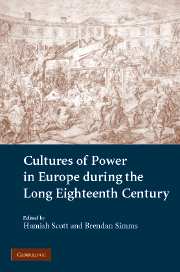Book contents
- Frontmatter
- Contents
- Preface
- List of contributors
- 1 Introduction: culture and power during the long eighteenth century
- 2 When culture meets power: the Prussian coronation of 1701
- 3 Military culture in the Reich, c. 1680–1806
- 4 Diplomatic culture in old regime Europe
- 5 Early eighteenth-century Britain as a confessional state
- 6 ‘Ministers of Europe’: British strategic culture, 1714–1760
- 7 Confessional power and the power of confession: concealing and revealing the faith in Alpine Salzburg, 1730–1734
- 8 The transformation of the Aufklärung: from the idea of power to the power of ideas
- 9 Culture and Bürgerlichkeit in eighteenth-century Germany
- 10 The politics of language and the languages of politics: Latin and the vernaculars in eighteenth-century Hungary
- 11 ‘Silence, respect obedience’: political culture in Louis XV's France
- 12 Joseph II, petitions and the public sphere
- 13 The court nobility and the origins of the French Revolution
- 14 The French Revolution and the abolition of nobility
- 15 Foreign policy and political culture in later eighteenth-century France
- 16 Power and patronage in Mozart's La clemenza di Tito and Die Zauberflöte
- 17 Between Louis and Ludwig: from the culture of French power to the power of German culture, c. 1789–1848
- Index
5 - Early eighteenth-century Britain as a confessional state
Published online by Cambridge University Press: 17 July 2009
- Frontmatter
- Contents
- Preface
- List of contributors
- 1 Introduction: culture and power during the long eighteenth century
- 2 When culture meets power: the Prussian coronation of 1701
- 3 Military culture in the Reich, c. 1680–1806
- 4 Diplomatic culture in old regime Europe
- 5 Early eighteenth-century Britain as a confessional state
- 6 ‘Ministers of Europe’: British strategic culture, 1714–1760
- 7 Confessional power and the power of confession: concealing and revealing the faith in Alpine Salzburg, 1730–1734
- 8 The transformation of the Aufklärung: from the idea of power to the power of ideas
- 9 Culture and Bürgerlichkeit in eighteenth-century Germany
- 10 The politics of language and the languages of politics: Latin and the vernaculars in eighteenth-century Hungary
- 11 ‘Silence, respect obedience’: political culture in Louis XV's France
- 12 Joseph II, petitions and the public sphere
- 13 The court nobility and the origins of the French Revolution
- 14 The French Revolution and the abolition of nobility
- 15 Foreign policy and political culture in later eighteenth-century France
- 16 Power and patronage in Mozart's La clemenza di Tito and Die Zauberflöte
- 17 Between Louis and Ludwig: from the culture of French power to the power of German culture, c. 1789–1848
- Index
Summary
As Tim Blanning has reminded us, ‘the eighteenth century was the Protestant century in England’ and ‘the triumph of Protestant Christianity permeated English culture in the eighteenth century, however much freethinking contemporaries such as Hume and Voltaire chose to ignore it when discussing the English national character’. But was eighteenth-century Britain, as opposed to simply England, a confessional state or merely a Protestant one and does it, to put it bluntly, actually matter if was both, one or neither?
The most serious and sustained attempt to show that the idea of the confessional state is pertinent within the British Isles emanates from Jonathan Clark's English Society, which burst on to the historiographical scene in 1985. While the first edition of that work was a precision strike designed to awaken English historians from their Whiggish dreams, the second edition, with its doorstop appearance and Germanic doctoral dissertation length, was more akin to carpet bombing in its attempts to bludgeon opponents to accept Clark's contention that the way in which eighteenth-century English history is studied needs to be substantially revised and reconceptualised. The 2000 edition stretched the boundaries of the ‘long eighteenth century’ even further back – it now encompasses 1660 to 1832. To put it crudely, Clark argues that eighteenth-century British history has far more in common with what came before it, with the dynastic and religious ideas of the seventeenth century, than with the growth of radicalism and democracy in the nineteenth century.
- Type
- Chapter
- Information
- Publisher: Cambridge University PressPrint publication year: 2007
- 1
- Cited by



